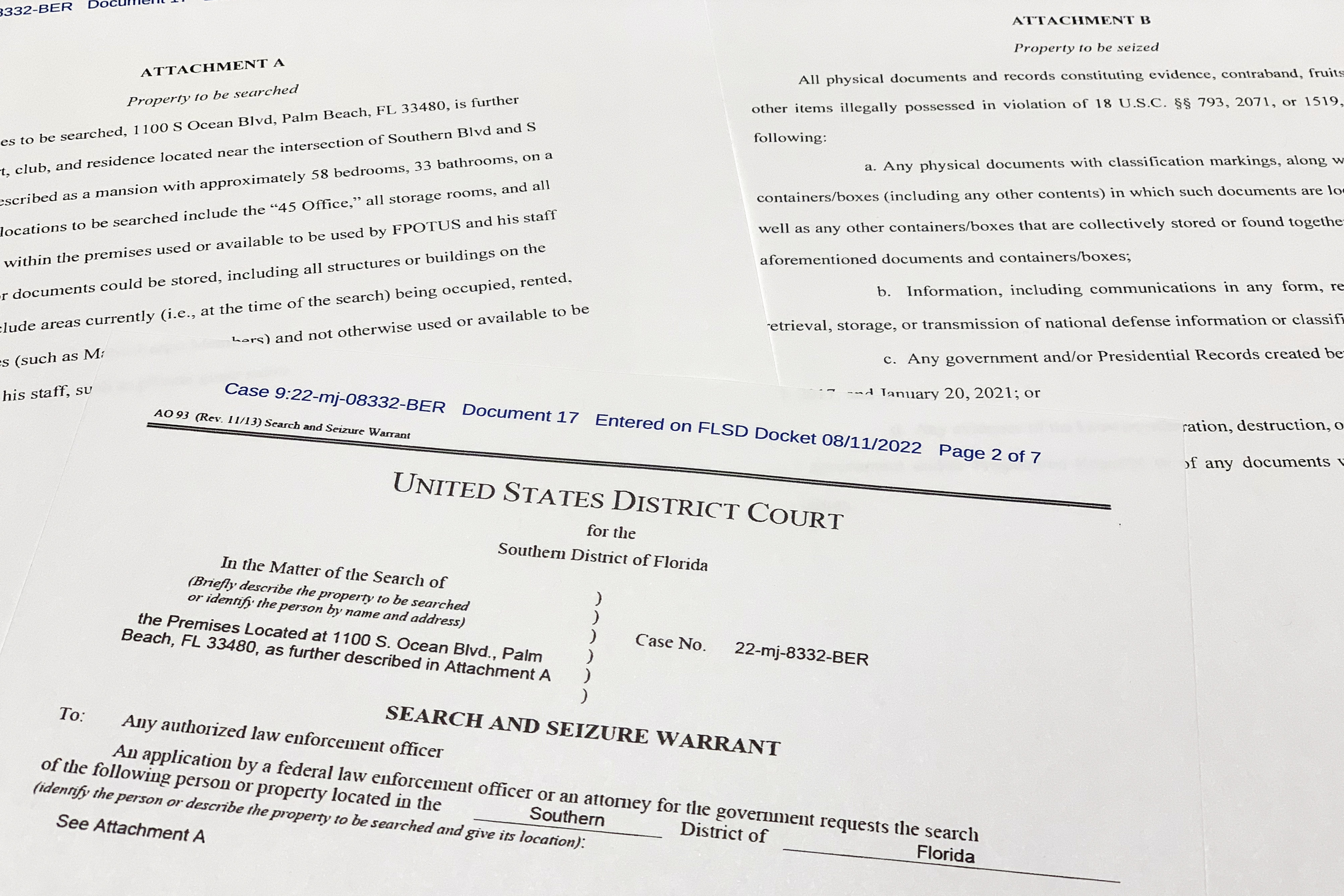WASHINGTON -- Hundreds of federal judges face the same task every day: review an affidavit submitted by federal agents and approve requests for a search warrant. But for U.S. Magistrate Judge Bruce Reinhart, the fallout from his decision to approve a search warrant has been far from routine.
He has faced a storm of death threats since his signature earlier this month cleared the way for the FBI to search former President Donald Trump's Mar-a-Lago estate as part of a probe into whether the former president inappropriately removed sensitive materials from the White House. Reinhart's home address was posted on right-wing sites, along with antisemitic slurs. The South Florida synagogue he attends canceled its Friday night Shabbat services in the wake of the uproar.
Trump has done little to lower the temperature among his supporters, decrying the search as political persecution and calling on Reinhart to recuse himself in the case because he has previously made political donations to Democrats. Reinhart has also, however, contributed to Republicans.
The threats against Reinhart are part of a broader attack on law enforcement, particularly the FBI, by Trump and his allies in the aftermath of the search. But experts warn that the focus on a judge, coming amid an uptick in threats to the judiciary in general, is dangerous for the rule of law in the U.S. and the country's viability as a democracy.
"Threats against judges fulfilling their constitutional responsibilities strike at the very core of our democracy," U.S. Second Circuit Judge Richard J. Sullivan, chair of the Judicial Conference Committee on Judicial Security, said in a statement issued recently in the aftermath of the search. "Judges should not have to fear retaliation for doing their jobs."
A phone message left in Reinhart's chambers was not immediately returned. He will preside over a hearing today on a request by media organizations seeking to unseal the underlying affidavit the Justice Department submitted when it asked for the Mar-a-Lago search warrant.
Asked to comment about measures it has taken to protect Reinhart and his family, the U.S. Marshals Service said in a statement that "while we do not discuss our specific security measures, we continuously review the measures in place and take appropriate steps to provide protection as necessary to ensure the integrity of the federal judicial process."
The vitriol directed at the magistrate, while striking, is becoming increasingly common. In 2014, the U.S. Marshals Service handled 768 incidents that it classified as "inappropriate communications" aimed at judges and court employees. Last year, it reported more than 4,500.
At one point "virtually everyone recognized how inappropriate it was to threaten the life or security of a judge because of a disagreement with the judge's decision," said Barbara Lynn, chief judge for the northern district of Texas. "Now I think there are a lot of people that don't think there's anything wrong with that."
Lynn is one of many judicial officials pushing Congress to approve the Daniel Anderl bill, named for the 20-year-old son of District Judge Esther Salas. He was killed in 2020 when a gunman came to their New Jersey home. His father was wounded. The bill, which has the support of groups ranging from the American Bar Association to the National Association of Attorneys General, would keep more of judges' personal information private.
In June, a retired Wisconsin county circuit judge, John Roemer, was killed in his home in what authorities said was a targeted killing by a gunman, who fatally wounded himself as well. Later that month, protesters converged on the homes of conservative U.S. Supreme Court justices after they overturned a 49-year-old ruling that women have a constitutional right to obtain an abortion. Police arrested a man with knives, zip ties and a gun near the home of Justice Brett Kavanaugh, and he said he planned to kill the conservative justice. Congress rapidly approved money to bolster security at the justices' homes and provide 24-hour protection to their families.
The increased targeting of judges comes as trust in public institutions plummets and partisan rhetoric escalates. It's part of a pattern that Steven Levitsky has seen before.
"This is a classic precursor of a democratic breakdown," said Levitsky, a Harvard political scientist and co-author of How Democracies Die. "To call this a warning sign is an understatement."
Trump's initial presidential campaign -- during which he personally condemned a judge who ruled against him in a lawsuit over his now-defunct Trump University -- changed the ground rules governing threats and explosive rhetoric, said Matthew Weil, executive director of the Democracy Initiative at the Bipartisan Policy Center in Washington, D.C.
"There are threats everywhere now, it's become more normalized because he changed what was allowed in public discourse," Weil said. Both the right and the left have turned to threatening the judicial branch, he said.
Nathan Hall, a principal consultant with the National Center for State Courts, noted that the combination of lagging public trust and access to judges' addresses and personal information impacts everyone from nationally known Supreme Court justices to otherwise-anonymous state judges.
"This gets to the core issue of having equal access to justice, a core foundational principle of our ability to function as a third and independent branch of government. It's really shaken to the core," Hall said. "Judges are just people at the end of the day. They put on a robe, but they still go home to their families."
The most recent warning sign came after last week's search of Mar-a-Lago, Trump's Florida resort and political and personal headquarters. FBI agents seized 11 sets of classified information as part of an investigation of three different federal laws, including one that governs gathering, transmitting or losing defense information under the Espionage Act, according to court records.
Trump accused the government of abuse of power in targeting him, and his supporters railed against the search online, targeting the FBI and Department of Justice. An armed man who posted threats against the FBI on Trump's Truth Social network was killed by authorities after he tried to storm the agency's Cincinnati office.
Trump and his supporters have waged rhetorical war against the FBI for years, since the investigation into whether his initial campaign was aided by Russia in 2016. The intense focus on an individual judge like Reinhart is relatively new.
Gretchen Helmke, a political scientist at the University of Rochester, said Trump's action mirrors what demagogues have done in other countries where democracy has collapsed. "A popularly elected leader targeting a judiciary is often one early indicator of democratic erosion," Helmke said in an email.
Helmke cited Venezuela, Bolivia and Peru as places where an incoming administration vowed to clean up the judiciary, then stocked it with its followers. "The public never develops any real trust or confidence in the judiciary, and it is essentially costless for each incoming administration to use the previous government's manipulation of the judiciary as a pretext to create the court it wants, Helmke said. "The end result is no judicial independence and no rule of law."
PENCE URGES GOP TO STOP
Former Vice President Mike Pence on Wednesday implored fellow Republicans to stop lashing out at the FBI over the search of Donald Trump's Florida home and denounced calls by some of the former president's allies to defund the FBI, saying that was "just as wrong" as a push by Democratic activists to shift money from police.
Pence also said he would give "due consideration" if asked to testify before the House committee investigating the riot at the U.S. Capitol on Jan. 6, 2021.
Speaking in New Hampshire, Pence said he has been troubled by what he called the politicization of the FBI. He also said the Justice Department and Attorney General Merrick Garland should be more forthcoming about what led authorities to conduct the search of Mar-a-Lago.
But Pence, who is trying to stake out his own political path as he and Trump both consider 2024 presidential campaigns, also had a message for the GOP.
"I also want to remind my fellow Republicans, we can hold the attorney general accountable for the decision he made without attacking the rank-and-file law enforcement personnel at the FBI," he said at the Politics & Eggs event, a breakfast gathering at St. Anselm College for business leaders that has become a customary stop for White House hopefuls in the early-voting state.
"The Republican Party is the party of law and order," Pence continued. "Our party stands with the men and women who stand on the thin blue line at the federal and state and local level, and these attacks on the FBI must stop. Calls to defund the FBI are just as wrong as calls to defund the police."
Trump and some other Republican lawmakers have tried to capitalize on the search by portraying it as an act of political persecution and an attack on the rule of law.
For the onetime political allies, their paths diverged on Jan. 6, 2021, when a mob of angry Trump supporters stormed the Capitol in an effort to stop Congress' formal certification of Joe Biden's presidential victory. Trump denounced his vice president, who was presiding over the Senate, for refusing to object to or delay the certification -- something Pence had no power to do. A fake gallows was constructed on the National Mall, and people who broke into the Capitol chanted, "Hang Mike Pence! Hang Mike Pence!"
Before Wednesday, Pence had refused to say whether he would engage with the House committee investigating the insurrection if the panel requested his testimony.
"If there was an invitation to participate, I would consider it," Pence said, adding he would first reflect "on the unique role" he was serving as vice president.
"It would be unprecedented in history for a vice president to be summoned to testify on Capitol Hill, but as I said, I don't want to prejudge," he said. "If ever any formal invitation was rendered to us, we'd give it due consideration."
A committee spokesperson declined comment on Pence's remarks.
Information for this article was contributed by Gary Fields, Nicholas Riccardi, Holly Ramer and Farnoush Amiri of The Associated Press.

